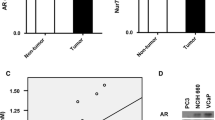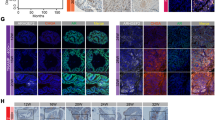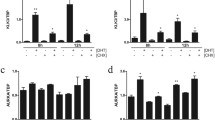Abstract
Although glioblastoma multiforme (GBM) is the most malignant primary human brain cancer with surprisingly high incidence rate in adult men than in women, the exact mechanism underlying this pronounced epidemiology is unclear. Here, we showed significant upregulated androgen receptor (AR) expression in the GBM tissue compared to the periphery normal brain tissue in patients. An expression of AR was further detected in all eight examined human GBM cell lines. To figure out whether AR signaling may play a role in GBM, we used high AR-expressing U87-MG GBM line for further study. We found that activation of transforming growth factor β (TGFβ) receptor signaling by TGFβ1 in GBM significantly inhibited cell growth and increased apoptosis. Moreover, application of active AR ligand 5α-dihydrotestosterone (DHT) significantly decreased the effect of TGFβ1 on GBM growth and apoptosis, suggesting that AR signaling pathway may contradict the effect of TGFβ receptor signaling in GBM. However, neither total protein nor the phosphorylated protein of SMAD3, a major TGFβ receptor signaling downstream effector in GBM, was affected by DHT, suggesting that AR activation may not affect the SMAD3 protein production or phosphorylation of TGFβ receptor and SMAD3. Finally, immunoprecipitation followed by immunoblot confirmed binding of pAR to pSMAD3, which may prevent the DNA binding of pSMAD3 and subsequently prevent its effect on cell growth in GBM. Taken together, our study suggests that AR signaling may promote tumorigenesis of GBM in adult men by inhibiting TGFβ receptor signaling.





Similar content being viewed by others
References
Schonberg DL, Bao S, Rich JN. Genomics informs glioblastoma biology. Nat Genet. 2013;45:1105–7.
Li S, Gao Y, Ma W, Guo W, Zhou G, Cheng T, et al. EGFR signaling-dependent inhibition of glioblastoma growth by ginsenoside Rh2. Tumour Biol. 2014;35:5593–8.
Chen J, Huang Q, Wang F. Inhibition of FoxO1 nuclear exclusion prevents metastasis of glioblastoma. Tumour Biol. 2014;35:7195–200.
Wang F, Xiao W, Sun J, Han D, Zhu Y. MiRNA-181c inhibits EGFR-signaling-dependent MMP9 activation via suppressing akt phosphorylation in glioblastoma. Tumour Biol. 2014.
Kabat GC, Etgen AM, Rohan TE. Do steroid hormones play a role in the etiology of glioma? Cancer Epidemiol Biomarkers Prev. 2010;19:2421–7.
Carroll RS, Zhang J, Dashner K, Sar M, Black PM. Steroid hormone receptors in astrocytic neoplasms. Neurosurgery. 1995;37:496–503. discussion 503–494.
Hill RA, Wu YW, Kwek P, van den Buuse M. Modulatory effects of sex steroid hormones on brain-derived neurotrophic factor-tyrosine kinase b expression during adolescent development in C57BI/6 mice. J Neuroendocrinol. 2012;24:774–88.
McEwen BS. Steroid hormones: effect on brain development and function. Horm Res. 1992;37 Suppl 3:1–10.
Zhu ML, Kyprianou N. Androgen receptor and growth factor signaling cross-talk in prostate cancer cells. Endocr Relat Cancer. 2008;15:841–9.
Massague J. TGFbeta in cancer. Cell. 2008;134:215–30.
Xiao X, Gaffar I, Guo P, Wiersch J, Fischbach S, Peirish L, et al. M2 macrophages promote beta-cell proliferation by up-regulation of SMAD7. Proc Natl Acad Sci U S A. 2014;111:E1211–1220.
Yi JJ, Barnes AP, Hand R, Polleux F, Ehlers MD. TGF-beta signaling specifies axons during brain development. Cell. 2010;142:144–57.
Ewen ME, Sluss HK, Whitehouse LL, Livingston DM. TGF beta inhibition of Cdk4 synthesis is linked to cell cycle arrest. Cell. 1993;74:1009–20.
Naka K, Hoshii T, Muraguchi T, Tadokoro Y, Ooshio T, Kondo Y, et al. TGF-beta-FOXO signalling maintains leukaemia-initiating cells in chronic myeloid leukaemia. Nature. 2010;463:676–80.
Xiao X, Wiersch J, El-Gohary Y, Guo P, Prasadan K, Paredes J, et al. TGFbeta receptor signaling is essential for inflammation-induced but not beta-cell workload-induced beta-cell proliferation. Diabetes. 2013;62:1217–26.
Golestaneh N, Mishra B. TGF-beta, neuronal stem cells and glioblastoma. Oncogene. 2005;24:5722–30.
Truty MJ, Urrutia R. Basics of TGF-beta and pancreatic cancer. Pancreatology. 2007;7:423–35.
Buck MB, Knabbe C. TGF-beta signaling in breast cancer. Ann N Y Acad Sci. 2006;1089:119–26.
Mishra L, Shetty K, Tang Y, Stuart A, Byers SW. The role of TGF-beta and Wnt signaling in gastrointestinal stem cells and cancer. Oncogene. 2005;24:5775–89.
Akhurst RJ, Derynck R. TGF-beta signaling in cancer—a double-edged sword. Trends Cell Biol. 2001;11:S44–51.
Derynck R, Akhurst RJ, Balmain A. TGF-beta signaling in tumor suppression and cancer progression. Nat Genet. 2001;29:117–29.
Zhu ML, Partin JV, Bruckheimer EM, Strup SE, Kyprianou N. TGF-beta signaling and androgen receptor status determine apoptotic cross-talk in human prostate cancer cells. Prostate. 2008;68:287–95.
Hayes SA, Zarnegar M, Sharma M, Yang F, Peehl DM, ten Dijke P, et al. SMAD3 represses androgen receptor-mediated transcription. Cancer Res. 2001;61:2112–8.
Mei Q, Li F, Quan H, Liu Y, Xu H. Busulfan inhibits growth of human osteosarcoma through miR-200 family micrornas in vitro and in vivo. Cancer Sci. 2014;105:755–62.
Acknowledgments
This work was supported by independent Innovation Foundation of Shandong University, IIFSDU NO: 2012TS186, Shan Dong provincial Natural Science Foundation (NO: ZR2013HL027) and Shandong traditional Chinese medicine science and technology development program (NO: 2011–212).
Conflicts of interest
None
Author information
Authors and Affiliations
Corresponding author
Rights and permissions
About this article
Cite this article
Yu, X., Jiang, Y., Wei, W. et al. Androgen receptor signaling regulates growth of glioblastoma multiforme in men. Tumor Biol. 36, 967–972 (2015). https://doi.org/10.1007/s13277-014-2709-z
Received:
Accepted:
Published:
Issue Date:
DOI: https://doi.org/10.1007/s13277-014-2709-z




